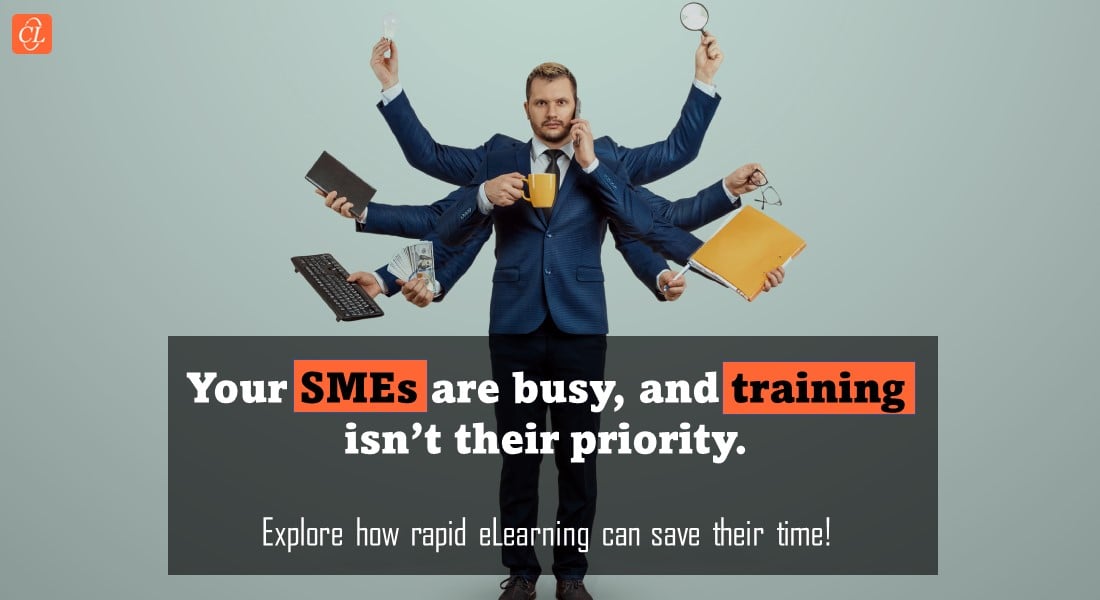Rapid eLearning Development: Tips to Save SMEs Time (and Your Sanity!) [eBook]
Subject Matter Experts (SMEs) are essential for rapid eLearning development. Their experience and expertise add weight to the process. But then, it also eats up a lot of their time! So how do we save their time? Read on to know.

SMEs – Subject Matter Experts- are high-profile professionals with an in-depth domain knowledge. While they are often involved in client meetings and solving high-priority client issues, their authority over the specific subject makes them a key part of training and development initiatives. They are usually involved in learning and development where their subject expertise is used as input driving each stage of the development. But what role do they have in rapid eLearning development? How do they fit into the process? Let us discuss –
Want to Save SMEs’ Time with Rapid eLearning Development?
These tips can help:
- Get Them Involved in the Project Right from the Start
- Gather Content from the SMEs Via Audio/Video
- Introduce Them to the Online Review Tools
The Role of an SME in Rapid eLearning Development
Help With Content Creation
When it comes to creating online training material, strong content is of utmost importance, and it can decide the success or failure of the course. That is where Subject Matter Experts’ (SMEs) role come into play. Based on their authority over the subject, the SME provides valuable, in-depth subject knowledge required for training.
Coming to rapid eLearning development, SMEs work with IDs for tasks related to content creation, and doubt resolution. They also help in planning the content flow to suit the learning preferences of the target audience.
Help in Storyboarding
Storyboarding is a step in eLearning development that reflects how the final outcome will turn out to be. Storyboarding serves as a prototype of the course to be developed.
When working on the storyboard for the eLearning development course, the SMEs and Instructional Designers (IDs) come together to discuss the content requirements. Based on the SMEs’ inputs, the IDs can decide on the best way to present the content, decide its flow, see if the text and images are in the right context and the placement of the interactivities. The SME is also responsible for signing off the storyboard.
Help Redesign Content According to eLearning Standards
SMEs are also important when it comes to redesigning content to make it more appropriate for online training. Consider this scenario – you have a lot of traditional classroom training content on a specific topic and want to turn it into an online course – who will you turn to?
Sure, an ID will help you with the technicalities, but it is the SME who provides inputs that will further help the ID decide on what interactivities to use. Their inputs help in picking out the text, images, animations, graphics, and other engaging functionalities.
Considering the diversified role they have to play, one thing is for sure – eLearning development does consume a lot of their time. So, what is the solution? How do we save SMEs time? The answer lies in Rapid eLearning Development!
Discover rapid eLearning for a quick rollout
Rapid eLearning Development uses the Successive Approximation Model (SAM) – which is an iterative model. The model encourages rapid development over perfection, and the SME is involved right from scratch. This way, they have a detailed understanding of the entire project and what the new developments are. And this cuts down on the time spent on going back and forth. Additionally, the use of rapid authoring tools cuts down on the time spent on reviews and feedback.
All these together contribute to saving the SMEs’ time. However, there are some tips that help do it with more efficiency! Let us discuss these tips.
Tips to Save SMEs Time With Rapid eLearning
Get Them Involved in the Project Right from the Start
The very first thing that you should be doing is to involve the SME right from the start i.e., from the planning phase of the rapid eLearning development. Their expertise can be used to set the learning objectives, the scope of the content, and the training expectations. At the same time, their input can be very helpful in identifying the right elements for the course.
Including them in the activities right from the start will help them plan their schedules in advance. At the same time, it helps the rest of the team members stay on the same page and have clear communication from the word go. This way, a lot of time for the SME can be saved as they do not have to go back and forth.
Gather Content from the SMEs Via Audio/Video
Strong fundamental and functional knowledge of the subject is vital when gathering content for an online training course. SMEs contribute to this by sharing their experience and expertise. But this activity takes up a significant amount of their time, especially if they have to share it over and over during the development.
One good way to address this is by recording their input. You could record the sessions for the teams to re-visit whenever required. Not only does it save SMEs’ time, but the snippets from the sessions where they quote war stories or experiences can also be used in the eLearning course to make it more authentic.
Introduce Them to the Online Review Tools
Rapid authoring tools are godsent for SMEs. Apart from the rapid development of the course, they also help with online reviews. There are several cloud-based collaboration tools that make reviewing easy and manageable. The review tools also make it easy to track and gather feedback, which saves SMEs time and effort.
Summing Up
Subject Matter Experts (SMEs) play a crucial role in eLearning development. Their involvement in the process results in a high-performing, online course that will have a lasting impact on the learners. Hope the article has helped you understand the role of an SME in rapid eLearning development. It also discussed 3 broad tips to save SMEs time. Want to discover them in detail and excel in eLearning development while also saving the valuable time of your SMEs? This eBook will help you with that.
Download the eBook to discover how to save SMEs time and make their life easy.





